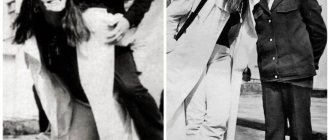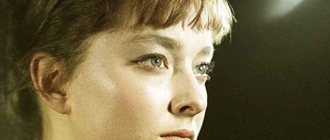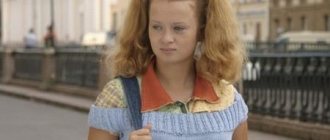Childhood
Lyuba was born in the city of Omsk on May 21, 1949.
In their family, only their father worked, Polishchuk Grigory Methodievich, a hereditary Don Cossack. He had a construction profession and worked on the railroad. Mom Olga Panteleevna is a very good seamstress; she earned a little extra money by doing this at home.
The family lived modestly, so Lyuba had to face life’s difficulties from childhood. Despite this, she grew up as a resilient and positive child. The girl really liked to dance and sing, and she especially loved to parody someone she knew, for which she received the nickname “artist.”
There was nothing in little Lyuba that said that in the future she would turn out to be a beauty. The girl suffered from rickets in childhood, as a result of which her legs were slightly bent. She constantly had low hemoglobin in her blood, and because of this, her complexion was pale. Thin and long, and also snub-nosed and slightly cross-eyed, Lyuba considered herself unattractive, but still really wanted to be an actress.
Childhood and youth of the actress
According to Wikipedia, Lyubov Polishchuk was born on May 21, 1949 in the city of Omsk. Here she spent her childhood and youth. The parents were simple people - Grigory Methodievich worked at a construction site, and his mother, Olga Panteleevna, was listed as a seamstress, but did not work in her specialty, subsisting on small orders at home. The family's income was more than modest; there was always a shortage of money. But the lively Lyubasha tried not to lose heart. Friends called her an artist for her ability to parody others, dance and sing. As a child, the girl fell in love with ballet and one day wanted to enroll in the Omsk ballet school. But because she was quite tall, she was not accepted. Then the purposeful schoolgirl went and signed up for the school choir. Soon the choir director made her a soloist. And indeed, Lyuba Polishchuk had a pleasant singing voice. Listen to how the song “Brown Eyes” sounds, performed by Lyubov Polishchuk (though already in adulthood).
After graduation, the girl went to the capital with the goal of enrolling in a theater school. But it turned out that the exams were already over. Lyuba had very little money, it was impossible to stay in a hotel, and she had to spend three nights at the station and order the cheapest dishes in the canteen.
But she managed to convincingly speak before the selection committee of the pop art workshop at Rosconcert and entered there, into the spoken genre department. Although according to the rules, only professional artists were accepted. While studying, Lyuba fell in love with the young actor Valery Makarov and married him in 1967. At the same time, Lyuba completed her studies at the workshop and, together with her husband, returned to Omsk, where at the local philharmonic society she performed in theatrical programs with humorous reprises and monologues by Maryan Belenky.
School years
Little Polishchuk was especially fascinated by ballet; she had never seen it live, but admired the dancers depicted on postcards. The little girl bought them at newsstands, came home, stood in front of a large mirror and repeated the positions of the ballerinas drawn on the postcards. And then she put a chair next to her, held on to its back, invented and performed various exercises, while feeling like a ballet dancer.
There was a ballet school in Omsk, and Lyuba really wanted to study there, but the girl was not accepted due to unsuitable physical parameters (very tall). She endured this first test that fate sent her. But then she was accepted into the school choir, and soon she was even chosen as a soloist. She took part in various competitions, one of which she won with “Song about Arithmetic”. From that day on, Polishchuk’s nickname changed; now at school she was called Arithmetic.
When Lyuba was in eighth grade, a drama club appeared at school, and she was one of the first to enroll in it. Her love for the stage overwhelmed her, and at every opportunity she ran to the performances of the Omsk Theater.
And in her last school years, the awkward girl blossomed and became very pretty. The boys showed her signs of attention, she felt that she was not like her classmates, and this further strengthened her desire to be an artist. The parents were surprised and not pleased by their daughter’s passion; it seemed to them that the profession of an actress was not serious. Mom wanted Lyuba to become a seamstress; she passed on all her experience to her daughter. Young Polishchuk sewed and knitted very well. Despite the fact that they lived poorly, the girl designed and sewed such dresses for herself that she was known as the first fashionista.
Personal life Lyubov Polishchuk
With son Alexei Makarov.
Lyubov Polishchuk's first marriage lasted 4 years, from 1967 to 1972. The chosen one of the then unknown artist was a guy with whom they studied in the same course. Valery Makarov and his wife came to Omsk after studying, and as a duo they worked in the local philharmonic. In this union, in 1972, a son, Alexey, appeared, who later, like his mother, became an actor.
According to the actress, the breakup with her first husband occurred due to his reluctance to support his other half in career development. Lyubov Grigorievna filed for divorce from her husband while she was pregnant; her father did not maintain contact with Alexey.
In 1984, Polishchuk married for the second time. The actress's husband, artist Sergei Tsigal, fell in love with her at first sight. This marriage was successful; in her husband, the actress found a friend and reliable support. This union produced a daughter, Marietta, who is now associated with the world of cinema and also broadcasts on the radio.
Study in Moscow
But after graduating from school, Lyuba told her parents that she was leaving for the capital to enroll in a theater school. She made a new dress out of her school uniform, put her simple belongings in a wooden suitcase, took thirty rubles from her parents and took the train to Moscow.
She didn’t have a single acquaintance in the capital, and she was late for exams at theater institutes. But Polishchuk had no intention of returning home. I found out that they were recruiting artists at the All-Russian Creative Workshop of Pop Art for the Omsk Regional Philharmonic, and went there. Before the commission, she sang songs by Robertino Loretti and Lyudmila Zykina and performed a shake dance. Lyuba made the selection committee laugh, however, despite the fact that the selection was made from professional artists, she was accepted.
Polishchuk rented a room in which she only managed to live for three days. Being late for class, she left the iron on; miraculously the room did not burn down, but she was denied further accommodation. But Lyuba was such a positive person that she was not frightened by the lack of housing. It was summer outside, you could spend the night in a square or park on a bench. And she put her wooden suitcase in a storage room at the railway station.
Then she rented another room, studied diligently and still managed to work as a watchman, nanny and housekeeper.
Biography
Soviet theater and film actress, teacher, People's Artist of Russia Lyubov Georgievna Polishchuk was born in 1949 in Omsk into an ordinary working-class family. The mother of the future actress worked as a seamstress, and her father was engaged in construction. During her school years, the girl was actively involved in dancing and music. She went to a local music school, performed at concerts and participated in all kinds of music competitions.
Lyubov Polishchuk in childhood
Then the future screen star did not think about an acting career; she wanted to become a singer. At the age of sixteen, Lyuba went to Moscow to enter the All-Russian Creative Workshop of Pop Art. The girl had to spend the night at the capital's train station for three days and eat in local canteens. Soon the applicant was accepted into the school and given a room in the dormitory.
The beginning of a creative journey
In 1967, Polishchuk graduated and went to work at the Omsk Philharmonic. She performed and toured as a spoken word artist, but with each new appearance on stage it became clear that she was a star. The public received the artist with such enthusiasm that the head of the Philharmonic realized that with such talent Lyuba would not stay here for long.
And soon an opportunity arose: the head of the Omsk Philharmonic, Yuri Yurovsky, was offered the position of director of Rosconcert in Moscow. Having left, after a while he invited Lyuba and her husband to the capital. In 1971, she began playing in the music hall and very soon received the main role in the play “The Red Arrow Arrives in Moscow.” The production was a success with the audience, but after some time it collapsed and the Moscow music hall actually ceased to exist.
In 1978, Lyuba began collaborating with Mosconcert, again performing monologues as a spoken word artist. For reading the works of Mikhail Zhvanetsky, she received first prize at the All-Russian Variety Artists Competition.
Theater
In 1979, Lyuba was invited to join the troupe of the Theater of Miniatures, where she appeared on stage for almost ten years. Finally, her talent as a dramatic actress was fully revealed; Polishchuk was involved in such famous productions as:
- “Chekhonte in the Hermitage”;
- "Vera and Zoyka";
- "The Peter Principle"
- "Celebrity";
- “Hello, Guy de Maupassant”;
- "Chronicle of a Widely Announced Death";
- "Zoyka's apartment."
Since 1989, Polishchuk began working at the School of Modern Play theater. Here she appeared on stage in the productions “A Man Came to a Woman,” “Antigone in New York” and “Who Are You in a Tailcoat?”
Along with working in cinema and theater, Lyuba received her education in absentia at the acting department of GITIS, which she graduated in 1985.
Since the beginning of the 90s, Polishchuk has participated in productions of private capital theaters and enterprises (Anton Chekhov Theater, Theatre):
- “In the same place, at the same time...”;
- "Honoring";
- "Quartet for Laura."
Film career
Insanely bright, beautiful, extravagant and talented Lyubov Polishchuk simply could not go unnoticed by those who made films. Her debut filming took place in 1974 in the film “The Starling and Lyra”, where Grigory Alexandrov decided to try her in a cameo role.
Next in her creative biography was an episodic role in the musical comedy “The Twelve Chairs” by Mark Zakharov, where Lyuba, paired with Andrei Mironov, performed the fiery “Tango of Passion”.
After this picture, other directors drew attention to the actress, and Polishchuk began to regularly receive invitations to film films. The audience also liked the young actress, only the big bosses in the world of cinema thought her face was “non-Soviet”, and the directors were forbidden to film Polishchuk in leading roles.
For a long time she acted only in episodes, but she did it so well and brightly that her heroines were sometimes remembered by the audience no less than the main characters:
- the smuggler from The Magic Lantern;
- Sally Wood in Goldfish;
- Larisa in "Golden Mine";
- Vera in "Snake Catcher";
- the owner of the "Black Horse" Queenie in the film "June 31";
- Bambarella in "The Lonely Businessman's Win";
- Diana in the film "Duenna";
- Jeannette in "The Suicide Club, or the Adventures of the Titled Person";
- Mallow in Babylon XX;
- Klava’s mother in the film “Please blame Klava K for my death”;
- Nesterov in “The White Crow”;
- singer Bertha in the film “That Same Munchausen”;
- Anna Marinova in “Attempt on GOELRO”.
There wasn’t a person on the set who didn’t like Polishchuk. Everyone adored her: from costume designers to makeup artists, from directors to film partners. Assistants always brought her coffee, tea or sandwiches.
With the advent of the 90s and the collapse of the USSR, the stereotypes of the “face of a Soviet woman” finally disappeared, and directors were able to film the unique actress in abundance, now in leading roles. Lyubov Polishchuk became an adornment of such films as:
- "Intergirl";
- “If you can, forgive me”;
- "Love with privileges";
- "Aesop";
- "Womanizer";
- "The Mystery of the Blackbirds";
- “The third is not superfluous”;
- "Shirley-myrli";
- "Quiet pools";
- "Valentine's Day";
- "Snowy Love, or A Winter's Night's Dream."
One of her most striking recent roles was the mother of nanny Vicky in the TV series “My Fair Nanny.”
The actress devoted herself completely to her profession and did not spare her health one bit. With severe back pain, she came to film sets and went on the theater stage. During breaks, she lay in the dressing room on the couch, writhing in pain, and then got up again and continued to play easily and cheerfully. And only she herself knew what it cost her.
Filmography
Still from the film “The Twelve Chairs” Still from the film “Intergirl” Still from the film “Shirley-Myrli” Still from the film “Stepanych’s Spanish Voyage” Still from the film “My Fair Nanny”
- Twelve Chairs (1977)
- Golden Mine (1977)
- The Zatsepin family (1977)
- June 31 (1978)
- Duenna (1978)
- Please blame Klava K. for my death (1979)
- Babylon XX (1979)
- The Same Munchausen (1979)
- The Adventures of Prince Florizel (1979)
- White Raven (1980)
- Great Little War (1980)
- Shot in the Back (1980)
- Only at the Music Hall (1980)
- At someone else's holiday (1981)
- Incomparable Tips (1981)
- Vacation at your own expense (1981)
- Aesop (1981)
- Theft (1982)
- The Mystery of the Blackbirds (1983)
- I'm up for the challenge (1983)
- The Lonely Trader's Winnings (1984)
- If you can forgive me... (1984)
- Snakecatcher (1985)
- Wild Wind (1986)
- The Right People (1986)
- Attempt on GOELRO (1986)
- It doesn't happen once in a while (1987)
- Christians (1987)
- Kites do not share their prey (1988)
- Presumed Innocent (1988)
- Incident in Utinoozersk (1988)
- Intergirl (1989)
- Love with Benefits (1989)
- Devotee (1989)
- Bullshit (1989)
- I'm Just Fine (1989)
- Womanizer (1990)
- My Sailor (1990)
- Daddy and Ma'am (1990)
- Sanit Zone (1990)
- Recruiter (1991)
- Honeymoon (1991)
- Family Man (1991)
- Terrorist (1991)
- Puppy from the constellation Canes Venatici (1991)
- Womanizer-2 (1992)
- Someone Was Here (1992)
- New Odeon (1992)
- The Price of a Head (1992)
- Who are you in a tailcoat (1993)
- Your Fingers Smell of Incense (1993)
- Daphnis and Chloe (1993)
- Scandal in our Clochetown (1993)
- Don Quixote and Don Juan (1993)
- The third one is not superfluous (1994)
- A Game of Imagination (1995)
- Shirley-Myrley (1995)
- Impotent (1996)
- Kings of Russian Investigation (1996)
- Pages of Theater Parody (1996)
- God's Gift (1998)
- Quadrille (1998)
- Ultimatum (1999)
- Agent in a miniskirt (2000)
- Valentine's Day (2000)
- Game of Thrones (2000)
- A Knight's Romance (2000)
- Still waters (2000)
- Perfect Couple (2001)
- We did it! (2001)
- Peaches and Peppers. Courtly Stories (2003)
- Snowy Love, or A Winter's Night's Dream (2003)
- Russian Amazons-2 (2003)
- My Fair Nanny (2004-2006)
- Loving you is like a disaster
- Stepanych's Thai voyage (2005)
- Stepanych's Spanish Voyage (2006)
Personal life
Lyuba's first husband was the artist Valery Makarov. They met while studying in Moscow, then worked together at the Omsk Philharmonic. It was great and true love. In 1972, the couple had a son, Alexei.
Together they then decided to move from Omsk to the capital, but Polishchuk immediately got a job in Moscow, and Valery was never able to find his way into the profession. He began to drink, raise his hand against Lyuba, and scandals became more frequent. The actress endured it for a long time, but then she couldn’t stand it and filed for divorce. Since they had a child, the law allowed them three months to think about their decision. During this time, Valery began to drink even more, and their common son did not save their marriage.
Valera returned to Omsk, where he lived with his mother, continued to drink and died of a stroke at the age of 42. But Polishchuk remained in Moscow and, despite all the difficulties, continued to fulfill her dream. She went on tour with her little son, she had children’s clothes hanging in her hotel rooms, there were mashed potatoes and porridge on the table, and after that she still had to go on stage and perform beautifully. When her son became a little older, Lyubov sent him to a boarding school, where he spent most of his childhood.
Polishchuk's second husband was the artist Sergei Tsigal. He saw Lyuba on TV in some movie, and then went to her performance. For a long time he looked for mutual acquaintances who could introduce him to the actress. When they were finally introduced to each other, Lyuba had already heard a lot about the artist and that he dreamed of meeting her.
With Sergei, she found female happiness, took her son Alyoshka from the boarding school, fell in love with traveling, and began collecting beautiful things: porcelain dishes, mahogany furniture. When Lyuba found out about her pregnancy, Sergei proposed to her and they got married. Doctors forbade her to give birth, but the actress really wanted a daughter. The birth was difficult, she had a caesarean section and immediately had her appendix removed. But in October 1984, Lyuba and Sergei gave birth to a girl, Masha.
Soon after giving birth, she appeared on the theater stage, according to the plot of the play “Straw Hat” she had to dance and do the splits. Right during the act, the actress lost two spinal discs. And somehow suddenly after that illnesses began, then back, then sinusitis, then the flu. Although, until the age of 35, Lyuba did not even know what hospitals and doctors were, and now her entire subsequent life depended on them.
Polishchuk was told that she had a “non-Soviet face”
All life is overcoming
A strange law of life: a person must die for everyone to appreciate who he was for all of us. When Lyubov Polishchuk delighted us with roles, it seemed familiar. And only now it became clear: we didn’t love her, we underestimated her...
The bright, enchanting holiday woman, it turns out, has been overcoming something all her life. And only those close to her knew what success cost her.
They were forbidden to film
As a child, Lyuba had a terrible complex. What it took to overcome the habit of blushing “beet red” from embarrassment!
She started in the music hall. When she moved to the Moscow Theater of Miniatures in the early 80s, she said: “The withdrawal pains were strong. I didn’t know how to work without a microphone and, thinking that I couldn’t be heard, I forced the sound, constantly breaking my voice. I destroyed the scenery, killed my partners. In the music hall there were huge stages, but here there was a small theater stage, and God didn’t hurt me with my height, and if I jumped from one backstage, I immediately flew into another” (the actress’s height is 1 m 75 cm).
In communicating with directors, Polishchuk did not put up with injustice, servility and often suffered for her intractable character.
Once she dared to speak the truth to the management of Mosfilm, and she was put on the “black list” - she was forbidden to film. Then they refused to take the actress into films because of her resemblance to Sophia Loren. With its beauty and brightness, Love did not suit Soviet cinema, which needed images of women-mothers, modest workers. “Polishchuk has the face of a non-Soviet woman,” the tall boss issued a summary. And for several years Polishchuk was excluded from candidates for film roles. In films she was only featured in cameos.
The role in the film “12 Chairs” became his film debut and brought him popularity. Still from the film.
Raised my son alone
In her personal life, the actress was also unlucky for a long time. At home in Omsk, she married a colleague of Makarov. But, having given birth to her son Alexei, Lyubov immediately divorced - according to her, her husband drank like a cobbler. Raising my son was not easy. Although men often lost their heads over her. Women also fell in love with her.
“At that time I didn’t know what lesbian love was, and I couldn’t understand what these women who were on duty near my apartment needed,” the actress recalled. “One threatened to jump out of the window in the entrance if I didn’t open it.” Fans did not find understanding - Polishchuk had a bad attitude towards women's emancipation: they say that it became fashionable because there were few real men.
But a meeting with a real man - the artist Sergei Tsigal, with whom the actress was introduced by Khazanov and Rozovsky - happened in her life.
In those 80s, Tsigal drove recklessly in his Zhiguli car, and without studded tires: it was more risky, more adrenaline.
He put Lyubasha in his car and accelerated. I thought I would stun the beauty, but she smiled happily: “What a class!” And Tsigal understood: mine!
As Polishchuk said, doctors forbade her to give birth, but she really wanted a girl and soon realized that she was pregnant. After this event, Sergei came with flowers and awkwardly proposed to her. Lyuba agreed, laughing, and joked about how difficult it was to get married. Mashenka's appearance was very difficult. Polishchuk had a caesarean section and her appendicitis was immediately removed. Weakened, she went on stage and danced cancans in the performance and did splits. “And two spinal discs fell out right on stage in the play “Straw Hat,” the actress recalled, “because all the load was on my back, the muscles on my stomach didn’t work. Until I was 35, I wasn’t sick at all. And then all at once: my back, then I got sick with the flu, sinusitis. I spent a month in the hospital.”
I had to undergo treatment, but my soul shrank from worries about my daughter and family.
Sergei Tsigal with his daughter actress Marietta Tsigal-PolishchukPhoto: GLOBAL LOOK PRESS
Bad sign
“In recent years I have stopped dreaming. It so happened that all my dreams came true. I love, I am loved, I have children, a house, a job. I should be happy,” the actress said sadly. At that time, no one knew that Polishchuk had a fatal disease - spinal cancer - and it was becoming increasingly difficult for her to move.
Her relatives asked her why she stopped smiling at home, she answered: “My muscles are locked in my face, and everything hurts.”
In 2000, she rehearsed the play “Temptation” with Sergei Bezrukov. In it, her heroine gets into an accident. Two weeks before the premiere, Polishchuk also had an accident - she injured her neck, ribs, and received a spinal injury. The actors consider this coincidence a harbinger of misfortune. Two days later, the actress appeared at a rehearsal with a corset around her neck—the vertebral discs had shifted. She was asked to postpone the premiere. But she continued working. And after a while she stood on pointe shoes in the play “Whose Are You in a Tailcoat?”
Then she reproached herself: “Why the hell did I get on pointe shoes at the age of 45?! As Zhvanetsky said, the mind is inextricable. Do I need it with a bad back?!”
Polishchuk was told that she had a “non-Soviet face” Photo: GLOBAL LOOK PRESS
Disease
“She was forced to leave the theater. But, despite the doctors’ ban, she continued to act. We wondered: why?! Given how she's feeling! But she said that she couldn’t live without work,” says her friend.
Only to her loved ones did Lyubov admit that she was very tired of being sick. She suffered, suffered, but did not allow herself to despair, did not lose heart.
Doctors told the actress's relatives that she was doomed. Lyuba also knew about this. But she continued to live as if nothing had happened. Her family did everything possible: they found the best doctors, took her all over the world for examinations, procedures, operations, and bought the best medicines.
The actress was given a special corset that supported the spine, and she walked in it. Everyone was surprised that her character had not deteriorated at all, she did not demand special treatment for herself, and did not allow herself to be pitied. She was beautiful to the last - perhaps the beauty of her soul saved her...
She did not sleep at night because of the pain, sometimes she cried from powerlessness... Endless procedures, injections, chemotherapy, because of which her hair fell out and she had to wear a wig, it all resembled hell. But Lyubov wiped away her tears, straightened up and said: “Let’s not cry, she will live as long as she is allowed to live. With joy!"
She was propped up with pillows during filming.
For the last five years, Polishchuk has been undergoing non-stop treatment and, with the last of her strength, went in for sports, swam in the pool. On the set of the series “My Fair Nanny” she worked on equal terms with the young people - from 8 am to 12 midnight. And one day she fainted from fatigue... In the end she filmed while sitting, propping her back up with pillows - it was painful for her to stand. Sometimes she screamed from a sharp pain in her back, but immediately began to laugh... And then she ended up in the hospital for a long time and only asked the doctors for the last day of filming.
Nastya Zavorotnyuk says that Lyubov Grigorievna stood with a very straight back and smiled on that last day of shooting.
They filmed an episode where Polishchuk and Zavorotnyuk, having mixed up the audience, are standing near a huge coffin, and Zavorotnyuk, in character, says, with such a dowry, I’ll just have a line of suitors lining up.
In Intergirl the actress played the prostitute Zina. Still from the film.
Love answers her: “Knock on wood!” Both knock on the lid of the coffin, immediately come to their senses and scream and laugh in horror.
Actress Nazarova, playing Polishchuk’s mother, carries a picture and says: “Morning in a pine coffin.” “Not in the coffin, but in the forest, mom!” — Polishchuk corrects her for her role. Now this black humor began to seem like a prophecy.
In parting, Polishchuk told the film group workers: “I love you all very much! Thank you very much!" They never met again...
Last days
As a child, a fortune teller predicted great success, fame and, in the end, a government house for young Lyuba. At first the girl thought it was a prison, then a theater. But perhaps the state house is a hospital. True, the doctors sent the actress home to die... A friend says that in her last days Lyubov rarely regained consciousness. And... she screamed in pain so that the neighbors could hear.
Son Alexey answered questions from his acquaintances, saying that we were sitting with Sergei Tsigal and Masha near her bed and waiting - nothing else could be changed... Polishchuk left in the morning in a dream...
But no matter how much suffering befalls the actress, we will forever remember her smiling, full of life... Her talent was so joyful and generous!
Disease and death
In 2000, Polishchuk was in a car accident, which greatly aggravated her back condition. In 2005, the actress was given a terrible diagnosis - spinal sarcoma. She underwent long courses of treatment at the Botkin Clinic, at the Vishnevsky Institute. Then there was a very complex operation at the Burdenko Research Institute of Neurosurgery to remove part of the spine and rehabilitation in an Israeli private clinic. Nothing helped; in recent months the actress was under the influence of strong painkillers.
Two weeks before Lyubov’s death, her mother came to Moscow; she was getting ready all the time, but her daughter did not allow it. And when grandson Alexey called and said: “Grandma come, mom allowed it,” Olga Panteleevna felt that nothing good was worth expecting. Seeing her daughter, she realized that her bad premonitions were confirmed. A small face, all dried up, just bones covered with skin. Lyuba slept almost all the time; she was injected with strong drugs. For the last few days she hasn’t eaten anything, she just asked for ice cream, it’s clear that everything was burning inside her. I would eat a cold one and it would become a little easier.
On November 28, 2006, the actress’s heart stopped and she died in her sleep. She was buried in Moscow at the Troekurovsky cemetery. Both son and daughter Lyubov Polishchuk followed in their mother’s footsteps, choosing an acting path in life.
Personal life and family of the actress
The actress was officially married twice. In general, such a sexy lady could not have a shortage of fans and admirers. When she became famous, almost the entire male population of the country openly or secretly dreamed of such a woman.
As for the details of her personal life, the meeting with the actress’s first husband, Valery Makarov, took place in Moscow. Lyuba married him and remained married until 1976. If you don’t know the name of Lyubov Polishchuk’s son, then we inform you: in 1972, the couple had a son, who was named Alyosha. In 1976, the couple separated - Valery drank shamelessly, did not really want to work, and was not involved in raising his son. When Lyubov moved to live in the capital, life as a single mother was very difficult. I had to live with little Lesha in a modest rented living space. For some time the boy was in a boarding school, where his mother was forced to send him in order to have time to tour with the theater and travel around filming. The son of Lyubov Polishchuk Alexey Makarov is now a famous theater and film actor.
Polishchuk met her second husband, artist Sergei Tsigal, when they both worked in the miniature theater. The guys decided to register their relationship in 1984. In October of the same year, they had a daughter, who was named Marietta in honor of her paternal great-grandmother, the famous Soviet writer Marietta Shaginyan. Masha Tsigal, the daughter of Lyubov Polishchuk, grew up and followed in her mother’s footsteps. She became an actress, as well as a television and radio presenter.
The granddaughter of Lyubov Polishchuk, Varya (daughter of Alexey), as well as Grisha (son of Masha), did not see their grandmother alive, both were born after her death.










